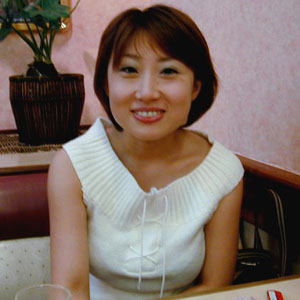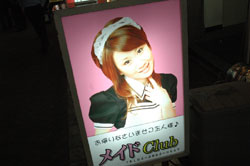Tokyo Hostess Interview Series (Part III)
The Hostess Series > I > II > III > IV > V > VI > VII
Life as a hostess in Japan might on the surface seem to be quite glamorous. She caters to customers that are always corporate men with large expense accounts. She puts her Sunday best on display everyday of the week. Her main worries don't usually extend much beyond the bounce of her hair and the application of her makeup. Sure, sometimes she must engage in boring conversations related to the latest business trends of her customers' industries. But simple flattery is usually all the depth that is needed. Who can't manage that? Then, of course, there is the lingering dream that one evening a company president in a sparkling Mercedes will arrive and sweep her off her high heels to a life of pure bliss.
 Tomoko Kuroda began working in the hostess world at the age of 17. Today, she is retired. But it was not until seven years had passed that she finally put her lighter and lipstick away for good. During this time, she discovered that working as a hostess is not as simple as knowing when to add ice to a customer's drink. It's a tough business. For starters, there were the nagging demands of the mama-sans. Then there was the constant need to defend herself from the advances of her customers - she adhered to a strict "no touch" policy. It finally became too much.
Tomoko Kuroda began working in the hostess world at the age of 17. Today, she is retired. But it was not until seven years had passed that she finally put her lighter and lipstick away for good. During this time, she discovered that working as a hostess is not as simple as knowing when to add ice to a customer's drink. It's a tough business. For starters, there were the nagging demands of the mama-sans. Then there was the constant need to defend herself from the advances of her customers - she adhered to a strict "no touch" policy. It finally became too much.
This week the Captain shares portions of his conversation with Tomoko from one recent evening at a coffee shop in Hachioji, Tokyo.
Profile
Name: Tomoko Kuroda
Age: 25
Former jobs: Hostess at more than ten snack and hostess clubs
Working hours: 3PM-4AM (on average)
Wage: 2,000 yen per hour (on average)
Current job: Selling eyewear
Home: Hachioji (in western Tokyo)
Hobbies: Reading books and karaoke
Interview
Captain Japan: Why did you decide to become a hostess?
Tomoko Kuroda: Well, my sempai (elder mentor) from high school was doing it. And I thought that I could do it better than her. So I called some ads in the newspaper.
CJ: Why did you decide to quit?
TK: There was too much stress for me. I had to take care of the customers. You know, as a hostess, it is not like we are friends with the customers. I had to take care of them as a customer. It was too much. So that is why I have taken a normal day job selling eyewear.
CJ: What does "take care of the customers" mean exactly?
TK: Well, I had to get sales during the day before working at the club at night. (The actual term in Japanese is dohan - Captain.) First, I would call customers by mobile phone and arrange for a dinner meeting. Then we would go to the club afterwards. So it becomes a day and night job. Then after finishing work, I might have to go out with customers again. At some places this was required. But at others, it was my choice and I would do it because it meant more money.
 CJ: What are the entrance prices?
CJ: What are the entrance prices?
TK: I worked at a variety of clubs with different policies. But usually, just entering is probably about 5,000 yen. Then, if a customer sits down and sees another girl he likes sitting at another table, he can select her. (The selection of a hostess is referred to as shimei in Japanese - Captain.), but the price goes up.
Also, for customers entering at around 7 or 8PM, it is cheaper than later in the evening. So when I made the dinner dates on the phone, I would make them late so that by the time we got to the club, it would be during an expensive time. This made the mama-san happy.
Then of course, there are the drink charges. On average: 1 glass of beer - 1,000 yen, 1 bottle of Yamazaki whiskey - 20,000 yen, and 1 bottle of Kyogetsu shochu - 5,000 yen.
CJ: What kinds of customers did you have?
TK: Well, it depends on the level. At the top clubs, there might be lawyers or doctors. You know, for them, I would read the Keizai Shimbun (financial newspaper) so that I could carry on a conversation in their business matters.
But at lower level clubs, like at a snack, it was much easier. Just typical office salarymen. I wouldn't have to study before work.
The type of customer is important. I would always try to work the conversation around what type of customer he is. It is an ongoing mental game. I had to change my attitude with each one. I had seen thousands of guys, so I knew so I could judge any particular type really quickly. This helped me to keep the conversation going.
CJ: Can you explain how you enforced your "no touch" policy with your customers?
TK: I had a special technique to keep them off. First, I always tried to exhibit a strong character while we were speaking. Then if he tried something, I would say, 'Don't touch!' (While saying this she also extended and retracted her left arm quickly - Captain.)
A strong attitude is the best way. Some girls don't realize this. They are more quiet and not as direct. This often puts them in an uncomfortable situation.
CJ: What is the difference between a good mama-san and a bad mama-san?
TK: There are a quite a few kinds of mama-sans. Some I liked. Others I didn't. But a good mama-san is one that listened to my problems.
A bad mama-san is like a witch. For example, one time, it became obvious that I was the best hostess in a particular club and, as you know, the mama-san is always supposed to be number one. So, we wound up fighting quite often. The mama-san would get more pissed off with me and somehow found more energy to fight. I am an active person so I came right back at her. It was mostly just yelling.
Also, the hierarchy creates trouble. First is the mama-san, followed by the hostesses and the scouts. In the daytime, the scouts hunt for hostesses. (In the evening, they are the doormen at the club - Captain.) If our scouts didn't bring in nice hostesses, the mama-san became angry. The mama-san put a lot of pressure on them. I didn't like to see that.
CJ: Were there quotas for you at the clubs?
 TK: Well, in one week on average I had to bring in a minimum of five people to the club myself. Essentially, one a night. This was through the dinner dates.
TK: Well, in one week on average I had to bring in a minimum of five people to the club myself. Essentially, one a night. This was through the dinner dates.
But if I got selected by, for example, ten customers in one day then maybe I wouldn't have to meet the other quota. This helped a lot. When I arranged the dinner dates, I would also tell customers my schedule for the week. So they could select me in advance for any particular day.
CJ: Were you able to make friends with your colleagues?
TK: Not really. The competition for customers was just too strong. As I said, the customer could select the girls. So if a customer had money, all the girls wanted him. So, it was hard to be friends. But there are a few girls that I still talk to.
CJ: What kind of preparation did you have for yourself on a daily basis?
TK: I had to go to a beauty salon. But these clubs are all in Hachioji (About an hour by train from central Tokyo - Captain.) and not in Ginza. So, basically, I just had to look nice.
But, you see, each hostess has her own standard equipment. Essentially the basics for any hostess are: lipstick, handkerchief, lighter, cigarettes, memo pad, pen, and mirror. The 'seven-pack' is what we call it.
CJ: Does the poor Japanese economy have an effect on the hostess business?
TK: Of course, it is easy for these clubs to be influenced by the economy. But you must remember, quality is the most important thing. So if a club is being influenced by the economy in a negative way, then that means there are not many good hostesses at that club.
CJ: Can you give an example of an interesting customer?
TK: One time, a guy from Hiroshima came in. He usually had his own special girl. But on this night she wasn't there and he selected me. He ended up liking me quite a bit.
Then he returned to the club some time later and asked for me, but I had quit to get married. The mama-san usually doesn't mention personal things with customers so she didn't tell him this. So he started a big fight with the mama-san and demanded that she find me. Finally, she told him of my marriage. And you know, he gave the mama-san 300,000 yen to give to me for presents. I never took it when I found out. Still, it was pretty amazing.
CJ: Would you consider being a hostess again?
TK: I don't think so. But if I do, it would have to be for a club with a strong reputation.
The Hostess Series > I > II > III > IV > V > VI > VII

